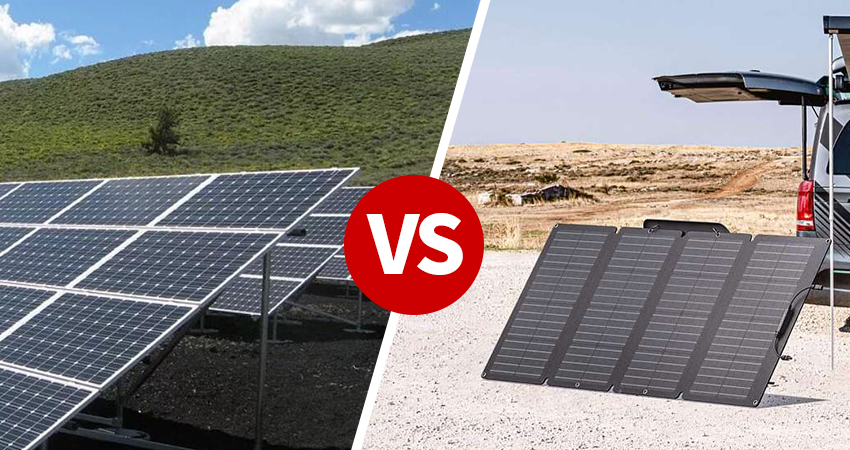Mono vs. Portable Solar Panel
In the quest for sustainable and clean energy sources, solar power has emerged as a frontrunner. Solar panels are an integral part of harnessing this abundant energy source. However, when it comes to installing solar panels, one must make a crucial decision: mono or portable panels? In this discussion, we will delve into the advantages and disadvantages of each option, helping you make an informed choice tailored to your specific needs of solar generation system.

Mono Solar Panel:
Mono solar panels, also known as stationary or roof-mounted panels, are the more traditional and permanent solution for harnessing solar energy. Here are some key aspects to consider:
- Energy Efficiency. Mono solar panels are generally more energy-efficient than their portable counterparts. They can be precisely oriented to maximize exposure to sunlight, optimizing energy production. This is particularly important in areas with inconsistent sunlight.
- Durability. Once installed, mono solar plates are robust and require minimal maintenance. They are designed to withstand various weather conditions, including rain, snow, and high winds.
- Aesthetic Considerations. Stationary panels can be integrated into the architecture of your home or building, maintaining the aesthetics of the property. They are a more discreet option compared to portable panels, which are often visibly placed in the open.
- Permitting and Regulations. Installing monocrystalline pv panels may require obtaining permits and complying with local regulations. These processes can be time-consuming and involve additional costs.
- Higher Initial Investment. The installation of mono panels typically comes with a higher upfront cost due to materials, labor, and permitting. However, long-term savings can offset this initial investment.
- Long-term Investment. Mono panels are a long-term investment with a lifespan of 25 years or more. They continue to generate electricity throughout their lifespan, making them a financially sound choice over time.
Portable Solar Panel:
Portable solar panels offer flexibility and mobility, making them a popular choice for those who require energy on the go. Let's explore their advantages and disadvantages:
- Portability. The primary advantage of folding solar panels is their mobility. They can be easily transported to different locations, making them ideal for camping, RVs, boats, and off-grid adventures.
- Quick Setup. Setting up portable photovoltaic panel is a straightforward process. They usually come with built-in stands or can be propped up at an optimal angle to capture sunlight.
- Limited Energy Production. Portable panels are generally less efficient than mono panels due to their smaller size and less precise positioning. They may not provide enough power for larger energy demands.
- Weather Dependency. Portable panels are susceptible to weather conditions and shading. Cloudy days or obstructions can significantly reduce their energy output.
- Shorter Lifespan. The average lifespan of flexible solar panels is shorter compared to fixed panels, typically around 10-15 years. This means they may require replacement sooner.
In the debate between mono and portable solar panels, there is no one-size-fits-all answer. The choice ultimately depends on your unique circumstances and priorities. Mono panels offer efficiency, durability, and long-term savings, making them ideal for permanent energy solutions. On the other hand, portable panels provide mobility, quick setup, and affordability, catering to on-the-go energy needs. By carefully evaluating your energy requirements and considering the factors mentioned above, you can make an informed decision that aligns with your sustainability goals and lifestyle. In the end, both monocrystalline and portable solar panels contribute to a cleaner and more sustainable future.
